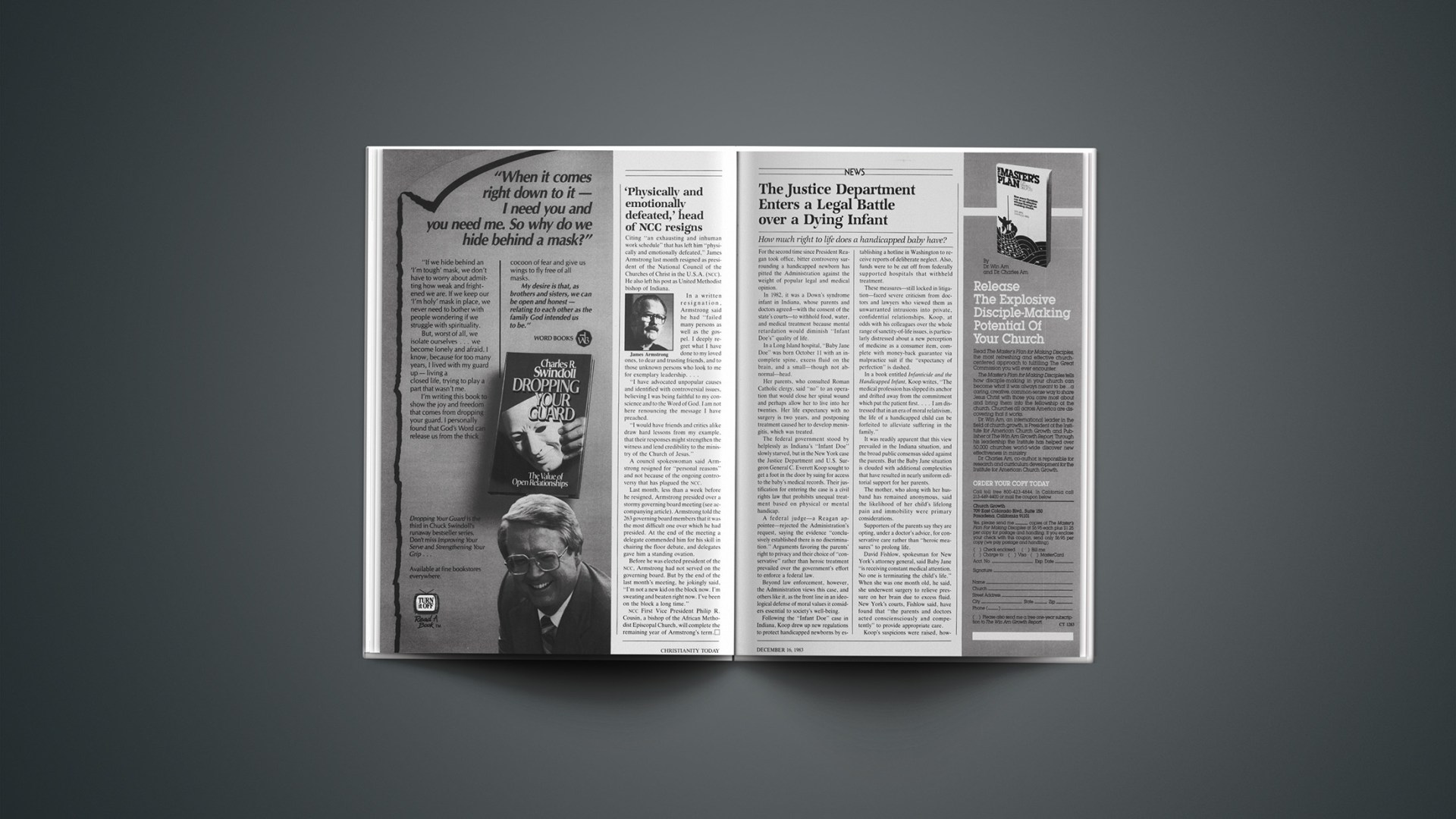How much right to life does a handicapped baby have?
For the second time since President Reagan took office, bitter controversy surrounding a handicapped newborn has pitted the Administration against the weight of popular legal and medical opinion.
In 1982, it was a Down’s syndrome infant in Indiana, whose parents and doctors agreed—with the consent of the state’s courts—to withhold food, water, and medical treatment because mental retardation would diminish “Infant Doe’s” quality of life.
In a Long Island hospital, “Baby Jane Doe” was born October 11 with an incomplete spine, excess fluid on the brain, and a small—though not abnormal—head.
Her parents, who consulted Roman Catholic clergy, said “no” to an operation that would close her spinal wound and perhaps allow her to live into her twenties. Her life expectancy with no surgery is two years, and postponing treatment caused her to develop meningitis, which was treated.
The federal government stood by helplessly as Indiana’s “Infant Doe” slowly starved, but in the New York case the Justice Department and U.S. Surgeon General C. Everett Koop sought to get a foot in the door by suing for access to the baby’s medical records. Their justification for entering the case is a civil rights law that prohibits unequal treatment based on physical or mental handicap.
A federal judge—a Reagan appointee—rejected the Administration’s request, saying the evidence “conclusively established there is no discrimination.” Arguments favoring the parents’ right to privacy and their choice of “conservative” rather than heroic treatment prevailed over the government’s effort to enforce a federal law.
Beyond law enforcement, however, the Administration views this case, and others like it, as the front line in an ideological defense of moral values it considers essential to society’s well-being.
Following the “Infant Doe” case in Indiana, Koop drew up new regulations to protect handicapped newborns by establishing a hotline in Washington to receive reports of deliberate neglect. Also, funds were to be cut off from federally supported hospitals that withheld treatment.
These measures—still locked in litigation—faced severe criticism from doctors and lawyers who viewed them as unwarranted intrusions into private, confidential relationships. Koop, at odds with his colleagues over the whole range of sanctity-of-life issues, is particularly distressed about a new perception of medicine as a consumer item, complete with money-back guarantee via malpractice suit if the “expectancy of perfection” is dashed.
In a book entitled Infanticide and the Handicapped Infant, Koop writes, “The medical profession has slipped its anchor and drifted away from the commitment which put the patient first.… I am distressed that in an era of moral relativism, the life of a handicapped child can be forfeited to alleviate suffering in the family.”
It was readily apparent that this view prevailed in the Indiana situation, and the broad public consensus sided against the parents. But the Baby Jane situation is clouded with additional complexities that have resulted in nearly uniform editorial support for her parents.
The mother, who along with her husband has remained anonymous, said the likelihood of her child’s lifelong pain and immobility were primary considerations.
Supporters of the parents say they are opting, under a doctor’s advice, for conservative care rather than “heroic measures” to prolong life.
David Fishlow, spokesman for New York’s attorney general, said Baby Jane “is receiving constant medical attention. No one is terminating the child’s life.” When she was one month old, he said, she underwent surgery to relieve pressure on her brain due to excess fluid. New York’s courts, Fishlow said, have found that “the parents and doctors acted consciensciously and competently” to provide appropriate care.
Koop’s suspicions were raised, however, when diametrically opposed medical opinions were reached. A neurologist present just after Baby Jane’s birth recommended immediate surgery—standard procedure for the one in 1,000 babies born with spina bifida. The baby was transferred to another hospital, where a second neurologist painted a bleak picture for Baby Jane’s father of a life of paralysis, retardation, and chronic infection.
Fourteen hours after her birth, Baby Jane’s father decided against surgery, and the first neurologist withdrew from the case because he disagreed with the decision.
Koop believes these circumstances dictate the need for a third opinion, and his expertise in pediatric surgery give him a special professional interest as well.
He pointed out in a televised interview that requesting medical records is nothing extraordinary. “We have asked for records from 48 other institutions since April of this year and not one institution has failed to give us those records.” Koop at first tried to obtain Baby Jane’s records without going to court, but the effort was rebuffed.
Justice Department involvement in suing for the records is reminiscent, some say, of civil rights enforcement during the 1960s, protecting an individual against the ultimate discrimination. It is thoroughly consistent with Reagan’s antiabortion views, articulated some months ago in a Human Life Review essay.
Critics are quick to point out that Reagan is the same president who promised less government intrusion and more support for families. They say it is “preposterous” to liken the case to traditional civil rights interests, since a complicated mix of ethics and science yields no firm consensus in society.
Carl Horn III, a lawyer with the Justice Department’s civil rights division, says, “We’ve conceded that a degree of medical and parental discretion is appropriate, but as a matter of principle there have to be parameters.” Child abuse is a prime example, he said, because outside informers are encouraged to alert authorities, and the state’s interest in protecting life and health is seen as legitimate.
“We have to be willing to affirm absolutes while discussing nuances and exceptions,” Horn said. “It comes down to a basic attitude about life.”










